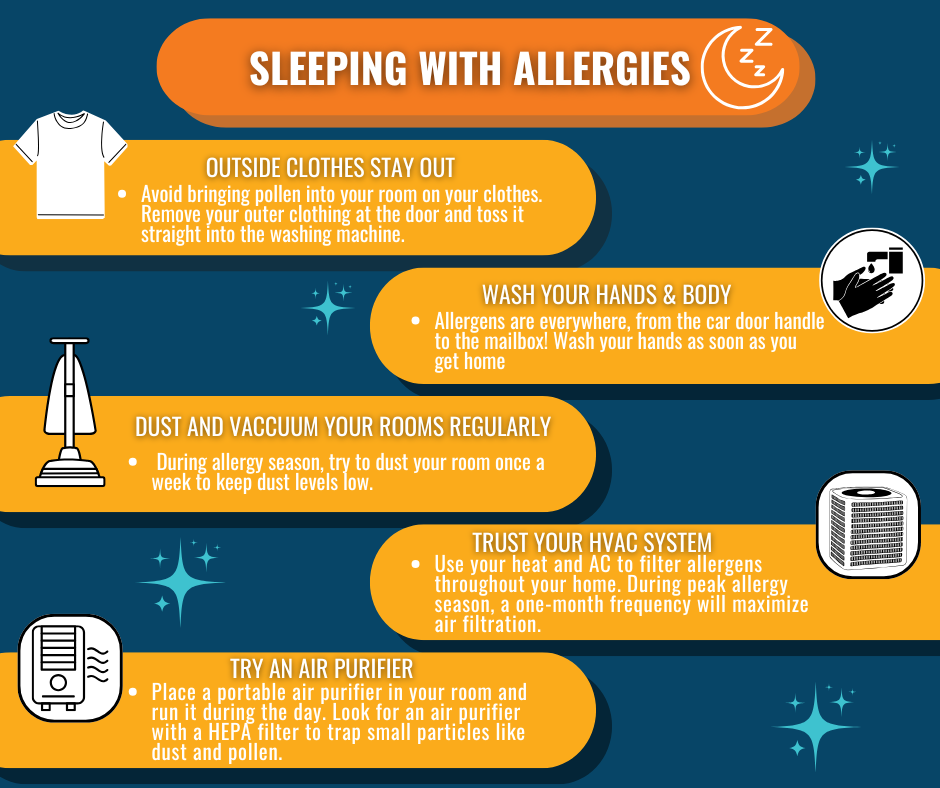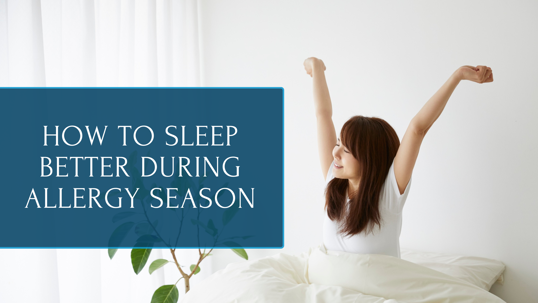Roughly a quarter of US adults have seasonal allergies. For some people, allergy symptoms worsen at night, making it challenging, if not impossible, to get a good night’s sleep. Fortunately, with regular cleaning and a well-maintained HVAC system, you can keep indoor allergens at bay. Learn how to sleep better despite Kansas City’s notoriously difficult allergy season with helpful tips from Mission Plumbing, Heating & Cooling.
Common Causes of Bedroom Allergies
Allergens are either brought into a space or originate there. For example, outdoor allergens like pollen and mold spores can be brought into a space on clothes, on pets, through open doors or windows, or through your HVAC system.
Indoor allergens, like dust, pet dander, or mold, originate indoors. You can prevent them to some extent, for example, by ensuring your bathroom has adequate ventilation, but you should also clean regularly to remove them.
Read more: How to Improve Indoor Air Quality

How to Sleep Better with Allergies
If you’re struggling to sleep through spring blooms, summer hay fever, or fall mold:
Dust and vacuum regularly—Bedrooms gather a lot of dust because we spend a lot of time in them, and there’s generally little airflow or ventilation, allowing dust to accumulate quickly. During allergy season, try to dust your room once a week to keep dust levels low.
Use your HVAC system—During allergy season, your heating or AC system can help clean the air, capturing allergens in the built-in filter as it heats or cools the air.
Don’t forget to replace your HVAC’s air filter every one to three months. During peak allergy season, a one-month frequency will maximize air filtration.
Finally, check your owner’s manual or contact Mission Plumbing, Heating & Cooling to see if a HEPA filter is compatible with your system.
Keep outside clothes out of the bedroom—Individuals with severe allergies should avoid bringing pollen into their bedrooms on their clothes. When you get home, remove your outer clothing at the door and put it straight in the washing machine.
Wash your hands frequently—It’s hard to avoid touching surfaces covered in pollen, dust, mold spores, and dander entirely. The best way to prevent irritation is to wash your hands frequently and avoid touching your face. If you’re very sensitive and have spent time outside exercising or gardening, it might make sense to take a shower to wash any particles from your hair and skin.
Allergies and Sleep: Why It’s So Hard to Get Shut-Eye
Allergies tend to be more severe in the evening due to increased exposure to indoor allergens and the body’s naturally elevated histamine levels. Due to airway anatomy, simply lying down can exacerbate symptoms for some individuals.
Does Sleeping with a Humidifier Help Allergies?
Sleeping with a humidifier may alleviate symptoms for some individuals, but it’s far from a universal solution. Too-high humidity levels may worsen allergy symptoms in individuals sensitive to mold or dust.
What Is the Best Temperature and Humidity for Sleeping?
The EPA recommends setting your thermostat between 60 and 67 degrees Fahrenheit and your home’s humidity between 30% and 50%.
Sleep Better with Help from Kansas City’s HVAC Pros
Mission Plumbing, Heating & Cooling is your go-to source for home service needs. We proudly serve the greater Kansas City, Lenexa, and Overland Park areas. Our team of skilled technicians offers reliable, quality work your family can rely on.
Contact our friendly team or call 913-347-5425 to schedule your appointment today. We look forward to helping you!

